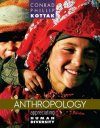![Anthropology: Appreciating Human Diversity Anthropology: Appreciating Human Diversity]()
Click to have a closer look
About this book
Contents
Biography
Related titles
About this book
A leading name in anthropology, Conrad Philip Kottak continues to define student learning in the general anthropology course. Anthropology: Appreciating Human Diversity offers an up-to-date holistic introduction to general anthropology from the four-field perspective. Key themes of appreciating the experiences students bring to the classroom, appreciating human diversity, and appreciating the field of anthropology are showcased throughout the text. Focusing on an increasingly interconnected world, the new Focus on Globalization essays examine topics as diverse as tourism in the ancient and modern worlds, global disease pandemics, world events (including the Olympics and the World Cup), and the expansion of international finance and branding.
Contents
Part I Introduction to Anthropology
1 What Is Anthropology?
2 Culture
3 Applying Anthropology
Part II Physical Anthropology and Archaeology
4 Doing Physical Anthropology and Archaeology
5 Evolution and Genetics
6 Human Variation and Adaptation
7 The Primates
8 Early Hominins
9 Archaic Homo
10 The Origin and Spread of Modern Humans
11 The First Farmers
12 The First Cities and States
Part III Appreciating Cultural Diversity
13 Theory and Methods in Cultural Anthropology
14 Language and Communication
15 Ethnicity and Race
16 Making a Living
17 Political Systems
18 Gender
19 Families, Kinship, and Descent
20 Marriage
21 Religion
22 Arts, Media, and Sports
Part IV The Changing World
23 The World System and Colonialism
24 Anthropology's Role in a Globalizing World
Customer Reviews
Biography
Conrad Phillip Kottak (A.B. Columbia College 1963; Ph.D. Columbia University, 1966) is a Professor and Chair of the Department of Anthropology at the University of Michigan, where he has taught since 1968. In 1991 he was honored for his teaching by the University and state of Michigan. In 1992 he received an excellence in teaching award from the College of Literature, Sciences, and the Arts of the University of Michigan. And in 1999 the American Anthropological Association (AAA) awarded Professor Kottak the AAA/Mayfield Award for Excellence in the Undergraduate Teaching of Anthropology. Professor Kottak has done ethnographic field work in Brazil (since 1962), Madagascar (since 1966), and the United States. His general interests are in the processes by which local cultures are incorporated--and resist incorporation--into larger systems. This interest links his earlier work on ecology and state formation in Africa and Madagascar to his more recent research on global change, national and international culture, and the mass media.































